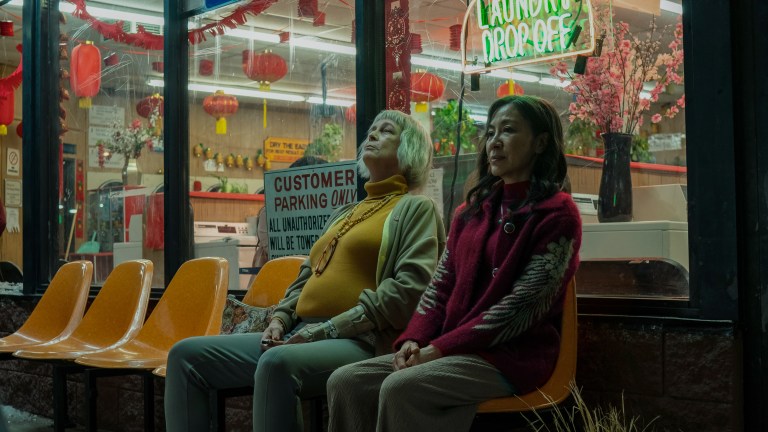Does Everything Everywhere All At Once Winning Mean the Oscars Are Now Cool?
Indie multiverse freakout movie wins Best Picture. Has the Academy finally caught up with the times?

Everything Everywhere All at Once got on a roll early Sunday night at the 95th annual Academy Awards, racking up early Best Supporting Actor and Actress wins for Ke Huy Quan and Jamie Lee Curtis respectively. By the time the ceremony was done three and a half hours later, the indie sci-fi movie about an immigrant woman and laundromat owner who saves the multiverse had racked up seven awards, including nearly all the heavyweights: Best Actress (Michelle Yeoh), Best Director (Daniels), Best Original Screenplay (Daniels), Best Editing (Paul Rogers), and, of course, Best Picture.
It felt in some ways like a sea change. Whatever you may think of it, Everything Everywhere All at Once was and is a genuine experiment in ambitious weirdness and unabashed genre filmmaking, a different animal altogether from conventional Best Picture picks of the past like Green Book or elevated arthouse fare like Nomadland. This felt like giving almost all the prizes to the biggest cult movie of the year, while also making history with two breakthrough wins for Asian actors.
But does this make the Oscars themselves – the longstanding, beleaguered ceremony that suffered from declining ratings, inept production decisions, and controversial live mishaps for a couple of years now – cool again?
The jury is still out on whether the new influx of Academy members, the preferential ballot for Best Picture, the continuing acceptance of genre cinema, and the new wave of progressive filmmakers raised on a diet of genre, video games, and social media will turn EEAAO’s triumph into an ongoing, permanent way forward for the Academy and its mix of aging old hands and diverse fresh faces.
But Sunday night’s event did make it seem possible. Without passing any judgment on their quality or merits (four of them, in fact, made our best-of-2022 lists), it’s notable that The Banshees of Inisherin, Tár, The Fabelmans, Elvis, and Triangle of Sadness walked away with zero Oscars between the five of them, despite nearly all being touted for at least some of the big trophies. And the two biggest movies of the year, Top Gun: Maverick and Avatar: The Way of Water, won one each.
Notwithstanding The Whale’s two pickups (a well-deserved Best Actor trophy for Brendan Fraser and Best Makeup and Hairstyling), the only other movie to come close to EEAAO’s haul was the four won by All Quiet on the Western Front, a German film that was a pickup – and almost an afterthought – for Netflix until it began to generate Oscar heat thanks to its unflinching adaptation of the book.
At some point in the last couple of weeks, as it racked up big wins from the Director’s Guild, the Producer’s Guild, and the Screen Actors’ Guild, EEAAO seemed inevitable to win the big prize at the Oscars, despite the Academy’s sometimes unpredictable voting and the fact that dark horses like All Quiet, The Fabelmans, and Top Gun: Maverick were still lurking in the wings.
But as the night went on at the Oscars, the runway became clearer for EEAAO and the element of surprise grew more faint. This little sci-fi mind-bender overcame the naysayers who didn’t think the Academy would go for a movie so outright weird and the pundits who thought that conventional thinking and confused responses to the movie itself would win or at least split the ballot.
Ironically, the victory for such a highly caffeinated film (its total budget was probably the daily motion capture bill for Avatar: The Way of Water) came as part of what was the most traditional Oscar ceremony we’ve seen in several years. Jimmy Kimmel hosted with just the right balance of good cheer, dutiful homage, and sarcastic asides (yes, he addressed the Slap, among other things), making us think that he could join the greats like Carson and Crystal and keep the job for a while.
But aside from some strange camerawork (lots of rather jarring closeups), the show ran smoothly and efficiently, with a minimum of clutter, some great speeches, and only a handful of mistakes. The blatant commercial for Disney’s live-action The Little Mermaid was offensive, as was the commercial for Warner Bros. Pictures’ 100-year anniversary. One of the song performances – oddly, for “This is a Life” from EEAAO – was flat-out bad. Yes, the show ran three-and-a-half hours; deal with it. In terms of the presentation, this was a straight down the middle Oscars, and we enjoyed it.
We’ll know within days (or even hours) how that reflected in the ratings and if the Academy turned things around this year. But in terms of the content, and the awards themselves, this was the most radical the Oscars have been since Parasite won Best Picture a few years back. The weird little sci-fi movie that seemed to never stop playing (don’t forget, it earned $108 million worldwide) was Hollywood’s darling for the night. That felt like progress. That felt cool.
